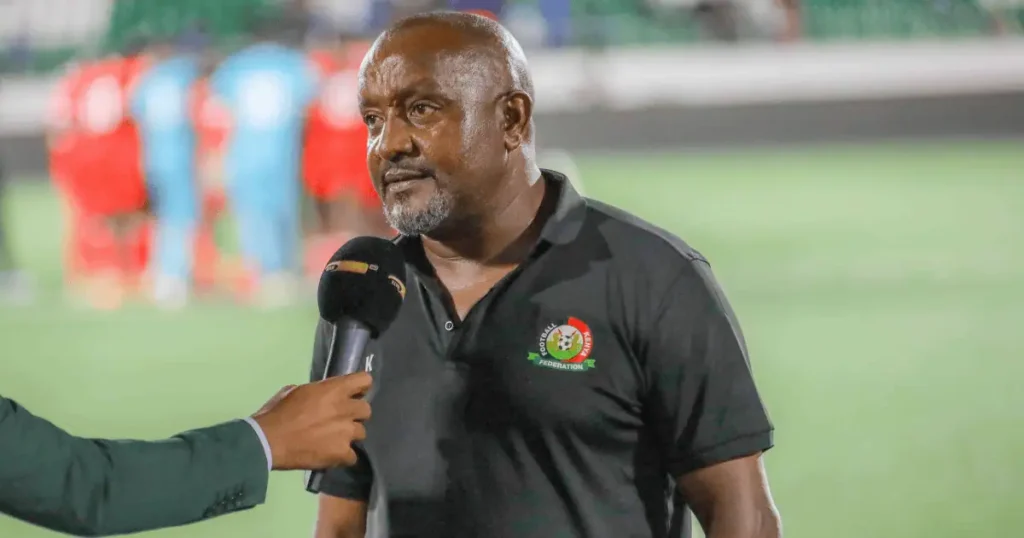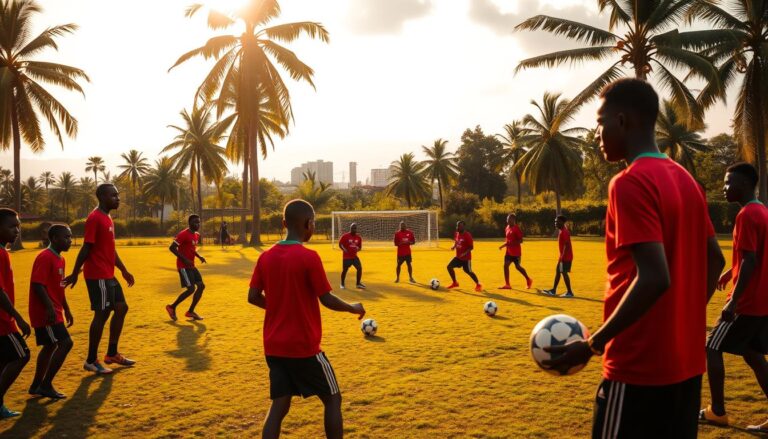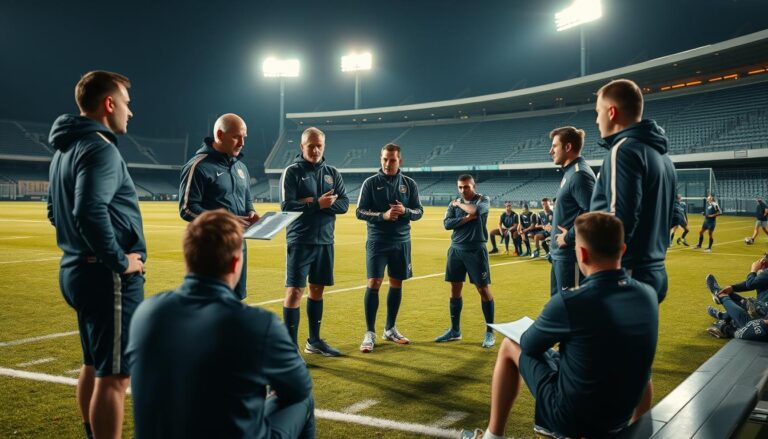In a move set to bolster the future of Kenyan football, Francis Kimanzi has been appointed as the new Football Development Director by the Football Kenya Federation (FKF). With over two decades of coaching experience, Kimanzi brings a wealth of knowledge to this pivotal role.
Kimanzi, renowned for his tenure as the head coach of Harambee Stars, has previously led top Kenyan clubs such as Mathare United and Tusker FC. His appointment underscores FKF’s strategic vision to enhance coaching standards and nurture young talent, crucial for the sport’s growth in Kenya.
The federation has expressed confidence in Kimanzi’s ability to drive this new chapter in Kenyan football. His leadership is expected to strengthen existing structures and pave the way for a sustainable talent pipeline, benefiting future generations of players and fans alike.
Key Takeaways
- Francis Kimanzi appointed as FKF Football Development Director
- Brings over 20 years of coaching experience to the role
- Aims to improve coaching standards and youth development in Kenyan football
- FKF’s strategic move to strengthen football infrastructure
- Expected to enhance Kenya’s preparations for upcoming international competitions
Background to the Appointment
Kimanzi’s journey in football began as a player before transitioning into coaching, where he made a name for himself in Kenyan football circles.
Kimanzi’s Journey in Football
His career spans over two decades, starting as a player before evolving into a coach. Kimanzi has coached several prominent clubs, including Mathare United and Tusker FC, where he gained recognition for his developmental skills.
Highlights from a Two-Decade Coaching Career
Notably, he served as the interim coach for the Harambee Stars, leading them in the Mapinduzi Cup. His experience was instrumental in the smooth transition of leadership to Benni McCarthy following Engin Firat’s departure.
His achievements include fostering young talent and improving coaching standards, which aligns with FKF’s vision for sustainable football development in Kenya.
Profile of Francis Kimanzi
Born on 29 May 1976 in Kitui, Francis Kimanzi has established himself as a pivotal figure in Kenyan football. His journey from a player to a renowned coach reflects his dedication and leadership qualities.
Kimanzi’s career began as a player for Mathare United before transitioning into coaching. This shift marked the start of a successful coaching journey, where he went on to manage several prominent clubs, including Wazito and Tusker FC. His experience with the Kenyan national team further cemented his reputation as a skilled coach.
Throughout his career, Kimanzi has achieved notable milestones. He guided Kenya to its highest-ever FIFA ranking of 68, showcasing his ability to lead and inspire teams. His leadership skills and extensive experience make him an ideal fit for his new role as the FKF Football Development Director.
As the FKF Development Director, Kimanzi is expected to focus on improving coaching standards and nurturing young talent. His deep understanding of Kenyan football, combined with his leadership qualities, positions him as a key figure in shaping the future of the sport in Kenya.
FKF’s Strategic Move and Vision
The appointment of Francis Kimanzi as the Football Development Director is a strategic step by the Football Kenya Federation (FKF) to enhance the future of Kenyan football. This move is part of a broader vision to create a sustainable foundation for the sport, focusing on both structural improvements and the nurturing of local talent.
Strengthening Structures
FKF aims to bolster the organisational and competitive structures within Kenyan football. By implementing robust coaching standards and improving facilities, the federation seeks to create an environment conducive to growth. These efforts are designed to ensure long-term success and competitiveness in both local and international arenas.
Nurturing Local Talent
A key aspect of FKF’s strategy is the development of local talent. Through initiatives such as youth academies and training programs, the federation hopes to cultivate a pipeline of skilled players. This focus on homegrown talent ensures a sustainable future for Kenyan football, aligning with the federation’s development agenda.
The collaboration with experienced figures like Benni McCarthy and the integration of South African expertise further enhance this vision. These partnerships bring valuable knowledge and resources, aiding in the refinement of coaching techniques and player development methods. As a result, Kenya’s football infrastructure is set to benefit significantly, preparing the nation for upcoming international competitions with a strong, locally nurtured squad.
The Role of Football Development Director
The appointment of Francis Kimanzi as the Football Development Director marks a significant step in shaping the future of Kenyan football. This role is pivotal in driving sustainable growth and fostering a competitive edge for the sport in Kenya.
Mandate and Responsibilities
Kimanzi’s primary responsibilities include overseeing the development of football at all levels. His mandate is to create a robust framework that supports both grassroots initiatives and elite team structures. This dual focus aims to ensure a steady supply of skilled players for the national team and domestic leagues.
A key aspect of his role is nurturing emerging talent. By establishing and enhancing youth development programs, Kimanzi will play a crucial part in identifying and grooming future stars. His experience as a coach will be instrumental in shaping these initiatives, ensuring they align with modern coaching techniques and standards.
Improving the overall structure of Kenyan football is another critical task. This includes upgrading training facilities, implementing advanced coaching methodologies, and fostering a culture of excellence. These efforts are designed to create a sustainable talent pipeline, benefiting both local clubs and the national team.
Kimanzi’s extensive coaching background brings valuable insights to this leadership role. His ability to connect with players and inspire growth will be essential in driving the federation’s vision. As the Football Development Director, he is well-positioned to steer Kenyan football toward a brighter, more competitive future.
Shaping the Future of Kenyan Football
Kenyan football stands at an exciting crossroads, with Francis Kimanzi’s leadership poised to bring transformative change. His innovative vision for the sport is set to shape the future of Kenyan football, focusing on sustainable growth and dynamic development.
Implications for the Harambee Stars
The Harambee Stars are expected to benefit significantly from Kimanzi’s leadership. His experience in fostering team dynamics and performance will likely enhance the national team’s competitiveness. With a focus on nurturing local talent, the Stars could see a new wave of skilled players emerging, ready to make their mark on the international stage.
Grassroots and Development Initiatives
Grassroots programmes are the backbone of any successful football development strategy. Kimanzi’s initiatives aim to identify and groom future stars from a young age, ensuring a steady supply of talented players. These programmes will not only strengthen local clubs but also provide a solid foundation for the national team’s future success.
Kimanzi’s appointment comes at a crucial time as Kenya seeks to regain its status in the region through structural reforms and youth development. His deep understanding of Kenyan football, combined with his leadership qualities, positions him as a key figure in shaping the future of the sport in Kenya.
Insights into Coaching Transitions
Coaching transitions play a pivotal role in shaping the trajectory of Kenyan football. These periods of change are crucial for maintaining continuity and ensuring the team’s performance remains consistent. The dynamics involved in such transitions are complex, requiring a balance between short-term stability and long-term strategic planning.
From Interim to Permanent Roles
Francis Kimanzi’s experience as an interim coach for the Harambee Stars is a prime example of effective transition management. During his tenure, he ensured a seamless handover to Benni McCarthy, the newly appointed head coach. This period was critical, as it set the stage for McCarthy’s preparation ahead of key matches against Gambia and Gabon.
Kimanzi’s role as an interim coach showcased his ability to maintain team morale and tactical coherence. His leadership during this phase was instrumental in keeping the team focused and prepared for upcoming challenges. This experience highlights his readiness for more permanent roles, where his deep understanding of Kenyan football can drive sustainable development.
The involvement of international experts, particularly South African figures like Benni McCarthy, has brought new dimensions to Kenyan football. Their expertise has enriched the coaching methodologies and player development approaches, aligning Kenyan football with global standards. This collaboration underscores the federation’s commitment to leveraging external knowledge to enhance local talent.
During transitional periods, the responsibilities of a coach intensify. They must manage existing structures while implementing new strategies. This dual role demands a unique blend of adaptability and visionary leadership, qualities that Kimanzi has demonstrated throughout his career.
As coach Francis, his varied roles have equipped him with the skills to navigate change effectively. His journey from a player to a coach and now to a developmental director illustrates his capacity to adapt and lead. This versatility reinforces his credibility in managing transitions and driving football development in Kenya.
Broad Impact on Local and International Football
The appointment of Francis Kimanzi as the Football Development Director is set to have far-reaching implications for both local and international football. His leadership is expected to elevate Kenyan football standards while strengthening the country’s presence on the global stage.
Locally, the focus will be on enhancing coaching standards and nurturing young talent. By improving grassroots structures, Kenya can develop a sustainable pipeline of skilled players. This not only benefits local clubs but also strengthens the national team.
On the international front, collaborations with experts like Benni McCarthy and other South African specialists will bring global best practices to Kenya. These partnerships are expected to refine coaching methodologies and player development, aligning Kenyan football with international standards.
The interplay between team management and strategic development will be crucial. Kimanzi’s experience in maintaining team morale and tactical coherence during transitions will be instrumental in this new role. His ability to connect with players and inspire growth will drive the federation’s vision forward.
Ultimately, the enhanced coaching and development initiatives will benefit both the Harambee Stars and local clubs. With a focus on sustainable growth, Kenyan football is poised to achieve new heights, both domestically and internationally.
Historic Milestones in Kenyan Football
Kenyan football has experienced a series of pivotal moments that have shaped its trajectory over the years. These milestones reflect both the triumphs and challenges faced by the Harambee Stars and the broader football community.
Notable Achievements and Struggles
The Harambee Stars have had their share of memorable victories and heart-wrenching defeats. One of the most significant achievements in recent history was the qualification of Kenya’s U-17 women’s team for the World Cup in 2024, marking a historic first for the country. This achievement underscores the potential for future success in Kenyan football.
Despite these successes, the journey has not been without its struggles. The Harambee Stars have yet to qualify for the FIFA World Cup, a goal that remains elusive. However, the current qualification campaign for the 2026 FIFA World Cup presents a new opportunity. With nine automatic spots allocated to Africa, Kenya is in a competitive Group F, currently sitting in fourth place. The team’s performance in upcoming matches against Gambia and Gabon will be crucial in determining their fate.
The evolution of coaching roles has also played a significant part in shaping Kenyan football. Coaches like Benni McCarthy have brought international expertise, influencing both player development and team strategy. McCarthy’s recent observations and satisfaction with the team’s initial training sessions suggest a positive direction for the squad.
Historical lessons from past coaching transitions, including those involving Francis Kimanzi, have informed current strategies. Kimanzi’s ability to maintain team morale and tactical coherence during his interim period set a foundation for future success. These experiences highlight the importance of adaptive leadership in navigating the complexities of modern football.
As Kenya looks to the future, the blend of historical insights and contemporary reforms offers a promising outlook. The focus on nurturing local talent and enhancing coaching standards aligns with the federation’s vision for sustainable growth. With a mix of experienced leaders and fresh perspectives, Kenyan football is poised to overcome past struggles and achieve new heights.
Challenges Facing the Development Agenda
While the appointment of Francis Kimanzi as the Football Development Director brings hope, the development agenda faces significant challenges. These obstacles must be addressed to ensure the success of Kenyan football.
Financial and Structural Obstacles
Financial mismanagement and structural inefficiencies are major hurdles. Audit reports reveal that poor financial management has hindered projects like stadium development and grassroots outreach. These issues affect both local clubs and the Harambee Stars.
Structural problems within the federation and broader organisational weaknesses further complicate progress. These challenges impact the overall effectiveness of football development initiatives, making it harder to achieve long-term goals.
Impact on Teams
Local teams struggle with inadequate facilities and limited resources, which hampers player development. The Harambee Stars also feel the effects, as insufficient funding can limit training and preparation for international competitions.
Planned Reforms
To tackle these issues, the FKF plans to implement reforms. These include improving financial management, enhancing organisational structures, and increasing transparency. Additionally, the federation aims to secure partnerships and funding to support development projects.
By addressing these challenges, the FKF can create a more sustainable and effective development agenda, ensuring a brighter future for Kenyan football.
Future Prospects and Growth Opportunities
The future of Kenyan football looks promising, with renewed focus on sustainable development and nurturing local talent. Stakeholders are optimistic about the sport’s growth, both domestically and internationally.
Sustainable Development in Football
The FKF has outlined plans to ensure long-term growth through sustainable development. This includes improving infrastructure, such as training facilities, and enhancing coaching standards. These efforts aim to create a competitive edge for Kenyan teams in both local and international arenas.
Fostering a New Generation of Local Talent
Initiatives like youth development programmes are central to fostering local talent. These programmes will identify and groom future stars, ensuring a steady supply of skilled players for the national team and domestic leagues. The involvement of experts like Benni McCarthy and South African specialists brings global best practices, enriching the development process.
With strong leadership and strategic reforms, Kenyan football is set to achieve new heights. The focus on local talent and sustainable development aligns with the federation’s vision, creating a resilient foundation for future success.
Looking Ahead: A New Era in Kenyan Football
As Kenya stands on the brink of a new era in football, the appointment of Francis Kimanzi as the Football Development Director signals a transformative chapter for the sport. With Kenya set to co-host the AFCON and revitalise its football structures, Kimanzi’s leadership is poised to be a cornerstone of this exciting new phase.
The strategic vision set forth by the FKF, under Kimanzi’s guidance, aims to create a sustainable future for Kenyan football. This includes strengthening structures, nurturing local talent, and ensuring a steady pipeline of skilled players for the Harambee Stars and domestic leagues. The involvement of international figures like Benni McCarthy complements Kimanzi’s experience, bringing global best practices to Kenya’s football development agenda.
Strong director-level leadership and a clear agenda are critical in shaping this new era. Kimanzi’s ability to inspire growth and maintain tactical coherence will be essential in driving the federation’s vision forward. With renewed focus and improved structures, Kenyan football is set to achieve new heights, both locally and internationally.


